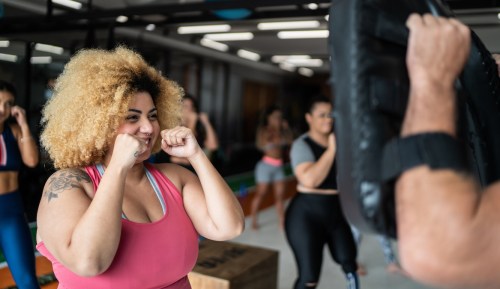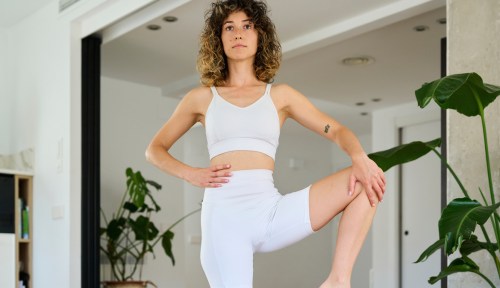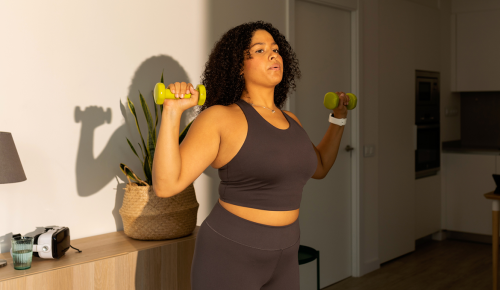Working out can be intimidating, especially if you don’t fit the mold. You know the one I mean: white, minimal body fat, extremely athletic. Images the fitness industry has force-fed us for decades usually feature a cis woman who’s strong but not visibly muscular, and is wearing the “perfect” athletic attire. Next to her is a cis man, lean but still ripped, most likely striking an athletic lunge or running pose.
Experts in This Article
Abiola Akanni is a Nigerian-American yoga educator who created Yoga by Biola, a series of online courses that promote Black wellness.
Ilya Parker is the founder of social justice platform Decolonizing Fitness.
Luca Page is the founder of Radically Fit
Those images, and the body ideals they promote, are the core of most traditional fitness spaces. The idea is that whiteness and a particular body type are synonymous with perfect health—and we should all strive for that.
Even as the pandemic forced many gyms and studios to go virtual, we were still bombarded with that same toxic messaging. The lack of diversity among instructors and the language used in online classes still ignored Black, Indigenous, and people of color (BIPOC) and bigger-bodied folks.
The inherent exclusivity in the fitness industry “can show up in myriad ways,” says Ilya Parker, founder of social justice platform Decolonizing Fitness, which offers consulting, books, and resources for trainers and other fitness pros to help unlearn damaging fitness culture. “Fatphobic and transphobic trainers, gyms that don’t meet the accessibility needs of disabled folks, and fitness clothing brands that don’t carry sizes above 2XL are just a few examples of how the industry alienates people.”
There is a lot of inherent pressure to either “look the part” or to desire to look the part, says Luca Page, founder of Radically Fit, a body-positive community gym for queer, trans, BIPOC, big-bodied and fat folks and their allies with varying abilities in Oakland, California. “And if those two things are not your reality, it can feel really alienating to do something as vulnerable as moving your body in front of other people in that space.”
I know that feeling all too well. As a Black, diabetic woman who stands at 5’10” and weighs somewhere in the 170 to 180 range, I do not fit into what the vast majority of the fitness industry deems a healthy, acceptable body. Nor will I ever. And that’s why I’m terrified to try to start working out again.
Back when I’d go to the gym more frequently, I would always be painfully aware of my apparent inadequacy. I was often the only Black woman present (or maybe, if I were lucky, one of a few). I noticed that instructors and other people working out had their expectations and preconceived notions about my abilities. Trainers would blow right past me to offer their services to white, athletic gym-goers. Yoga teachers never bothered to help me with my poses. It was subtle, but those little moments of neglect piled up and eventually left me feeling uncomfortable.
“I’ve definitely felt unseen in yoga classes and traditional fitness spaces because of my race but also because I don’t fit the monolith of Blackness that many white and Black folks assign to Black culture,” shares Abiola Akanni, a Nigerian-American yoga educator who created Yoga by Biola, a series of online courses that promote Black wellness.
Akanni’s work is inspired by her own journey to find her identity. Like many Black people who grew up in predominantly white spaces, she struggled with affirming herself. “As a result, I grew up hypercritical, many times abusing substances to numb feelings of isolation and constantly performing in spaces I didn’t feel like I belonged in,” she says. “Over time, I abdicated my authority and lost ownership in my own body.”
Yoga helped her find her autonomy and power. “It has nurtured me through deflective beliefs and provided an approachable science to discharge the trauma I held in my subconscious,” she says.
That kind of healing can only happen in a truly uplifting environment. Unfortunately, as Page points out, traditional gym spaces are often places where ableist, fatphobic, and diet culture sentiment is strong. “There is strong constant messaging about pushing yourself past your limit to lose weight, or to create a body that is deemed acceptable by a white supremacist lens, which is off-putting at the least and oftentimes harmful to the folks going into these spaces who are ‘othered,’ ” they say.
Think of common fitness mantras like “Earn your dessert,” “Pain is weakness leaving the body,” or “If you don’t squeeze your booty no one else will.” That kind of messaging has been pushed out for decades. The industry has been telling us—since long before some of us were born—that our motivation to work out should be shame. We should be ashamed of any stomach rolls or cellulite. And we should be ashamed if we aren’t spending enough of our free time working out.
The industry has been telling us—since long before some of us were born—that our motivation to work out should be shame.
Today, some fitness pros are actively working to make fitness more inclusive. For instance, Akanni offers packages like “Self Guided Yoga Course for the ‘Strong Black Womxn’ “and ‘Self Guided Yoga Course for Embracing Our Unique Blackness” which support Black folks unplugging and connecting with themselves. Through opportunities like one-on-one sessions and self-study exercises, these courses encourage users to unlearn some of the harmful narratives pushed onto Black folks.
“Non-performative” is a descriptor that comes up often in Akanni’s website. It’s a distinction that she says is to make sure people know that this form of yoga isn’t about striking the perfect pose. “It’s about sharing the practice beyond the poses from an inclusive lens, to appeal to bodies that western yoga unconsciously overlooks,” Akanni says.
That’s why she created iya, her latest venture. It’s a yoga platform “for all the misfits who didn’t quite fit in anywhere, yet wanted agency in their own body, and the ability to be who they are when no one’s watching, on and off the mat.”
Page can relate to feeling like a misfit. “I have lived in a bigger, brown body for most of my life and even when I got really into working out, I never felt particularly peaceful when moving my body,” they explain. Even when they were working in traditional fitness spaces, they still didn’t feel like they belonged. “It made it hard to be my authentic self.”
Page created the Oakland gym to cultivate the kind of environment they craved. “Radically Fit was inspired by the lack of spaces we saw that had these ethos,” they say. “We foster a space that is inclusive and fun! Movement should be centered in people’s joy—not people’s shame. Joy will keep you coming back and the goal is to make movement a lifelong practice.”
Take a look at Radically Fit’s website and you’ll get a sense of the gym’s energy. Not only do they make sure to advertise in writing that it’s a space for everyone, but they also feature animations of Black folks, disabled folks, and people of different body types enjoying working out. That diversity is seen in the gym’s staff, too.
And their classes are as wide-ranging as the clientele they cater to. Radically Fit has a workout no matter your bandwidth or abilities. If you’re queer and BIPOC, and looking for a workout to improve your strength and let off some steam, for instance, there’s a class for you: “BBQ: Black and Brown Queers.”
Page says a favorite workout is powerlifting. “Powerlifting has proven to folks over and over how strong they are, and completely moves around stereotypes about how someone looks,” they explain. “People are always amazed at how strong and empowered and badass they feel when they work with the barbell.”
To be honest, I’m still apprehensive about getting back into the swing of working out. But after hearing about this kind of work being done, I feel empowered to give a fitness routine a try again: I’m reminded that doing what’s right for my body is the way to go, no matter what the fitness industry has told me.
For the first time, I’m excited about reclaiming my fitness and body. And, contrary to what I used to think of working out, that feels really good.
Oh hi! You look like someone who loves free workouts, discounts for cutting-edge wellness brands, and exclusive Well+Good content. Sign up for Well+, our online community of wellness insiders, and unlock your rewards instantly.
Sign Up for Our Daily Newsletter
Get all the latest in wellness, trends, food, fitness, beauty, and more delivered right to your inbox.
Got it, you've been added to our email list.











